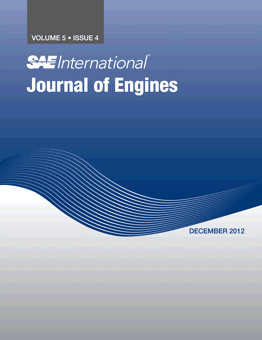
SAE International Journal of Engines
Scope & Guideline
Pioneering Research in Automotive Excellence
Introduction
Aims and Scopes
- Internal Combustion Engine Performance Optimization:
Research aimed at enhancing the efficiency, power output, and operational characteristics of various types of internal combustion engines, including gasoline, diesel, and alternative fuel engines. - Emission Reduction Technologies:
Innovative methods and technologies designed to reduce harmful emissions from combustion engines, including the development of advanced aftertreatment systems and alternative fuels. - Combustion Process Analysis and Modeling:
In-depth studies of combustion phenomena within engines, utilizing both experimental techniques and computational modeling to understand and optimize combustion behavior. - Fuel Technology and Alternative Fuels:
Exploration of various fuels, including biofuels and synthetic fuels, and their effects on engine performance and emissions, as well as the development of new fuel injection strategies. - Advanced Engine Control Systems:
Development of sophisticated control algorithms and systems, such as model predictive control and machine learning applications, to enhance engine operation and adapt to varying conditions. - Mechanical and Thermal Management:
Studies focused on the mechanical components of engines, thermal dynamics, and lubrication systems to improve overall engine reliability and efficiency. - Innovative Testing and Measurement Techniques:
Application of cutting-edge technologies and methodologies for measuring engine parameters, including in-cylinder pressure, exhaust emissions, and combustion characteristics.
Trending and Emerging
- Machine Learning and AI Applications:
The integration of machine learning and artificial intelligence in engine modeling, optimization, and diagnostics is rapidly increasing, reflecting the industry's move towards data-driven approaches for enhanced performance and efficiency. - Hydrogen and Alternative Fuel Research:
Research focused on hydrogen and other alternative fuels is on the rise, driven by the global push for cleaner energy sources and reduced carbon emissions in the transportation sector. - Advanced Combustion Strategies:
Innovations in combustion techniques, such as reactivity-controlled compression ignition and dual-fuel systems, are gaining attention as researchers seek ways to improve efficiency and reduce emissions. - Real-Time Emission Monitoring and Control:
The development of systems for real-time monitoring and control of engine emissions is trending, highlighting a shift towards more dynamic and responsive engine management systems. - Integration of Simulation and Experimental Validation:
A growing trend is the combination of numerical simulations with experimental validation, ensuring that theoretical models are grounded in real-world performance and behavior. - Sustainable and Eco-Friendly Engine Technologies:
Research aimed at developing eco-friendly technologies, including the use of biofuels and emissions reduction strategies, is increasingly relevant in response to environmental concerns.
Declining or Waning
- Traditional Fuel Combustion Studies:
Research focusing solely on conventional fuels without the integration of alternative fuels or advanced combustion techniques has decreased, reflecting a broader industry shift towards sustainability and cleaner energy sources. - Basic Engine Design Principles:
Papers that primarily discuss fundamental engine design without innovative applications or advanced technologies are becoming less common, as the field moves towards more complex and integrated approaches. - Mechanical Wear and Tear Studies:
While still relevant, studies specifically focused on mechanical wear and tear without incorporating new materials or coatings have seen a reduction, indicating a preference for research that includes advanced materials science. - Simple Emission Measurement Techniques:
Traditional methods of measuring engine emissions are being overshadowed by more sophisticated, real-time monitoring technologies, leading to fewer publications in this area. - Conventional Engine Testing Protocols:
Standard engine testing methodologies are being replaced by more dynamic and adaptive testing approaches, resulting in fewer publications that describe conventional testing methods.
Similar Journals

International Journal of Heavy Vehicle Systems
Driving Innovation in Heavy Vehicle SystemsThe International Journal of Heavy Vehicle Systems, published by INDERSCIENCE ENTERPRISES LTD in the United Kingdom, is a pivotal resource for professionals and researchers in the fields of automotive and mechanical engineering. With an ISSN of 1744-232X and an E-ISSN of 1741-5152, this journal serves as an academic platform dedicated to exploring the latest innovations and technologies pertaining to heavy vehicle systems, including design, performance, and environmental impact. Boasting a Category Quartile of Q3 in both Automotive and Mechanical Engineering as of 2023, it ranks among the growing body of literature in these disciplines, indicative of its commitment to quality research. The journal is widely accessible through diverse open access options, encouraging the dissemination of knowledge within the academic community. By publishing cutting-edge studies and reviews, the International Journal of Heavy Vehicle Systems plays an essential role in advancing our understanding of heavy vehicle technologies, providing invaluable insight for engineers, researchers, and students eager to contribute to this dynamic field.
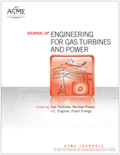
JOURNAL OF ENGINEERING FOR GAS TURBINES AND POWER-TRANSACTIONS OF THE ASME
Driving Excellence in Mechanical Engineering ResearchJournal of Engineering for Gas Turbines and Power - Transactions of the ASME, published by the esteemed American Society of Mechanical Engineers (ASME), is a leading interdisciplinary journal dedicated to advancing the fields of energy engineering, aerospace, nuclear energy, and mechanical engineering. With an impressive history dating back to 1960 and continuing its contributions through 2024, this journal boasts a Q2 ranking in multiple engineering categories, reflecting its strong impact on both academia and industry. Although not an open-access journal, it provides invaluable insights and research findings that cater to the needs of professionals, researchers, and students alike. The journal's ISSN is 0742-4795 with an E-ISSN of 1528-8919, ensuring widespread visibility in the global academic community. Indexed in Scopus, it ranks notably within its fields—21st in Nuclear Energy and Engineering and 51st in Aerospace Engineering—underscoring its relevance and contribution to critical technological advancements. Researchers in this domain will find the journal a vital resource for innovative studies, practical applications, and the latest developments related to gas turbines and power generation.

Journal of the Korean Society of Combustion
Exploring the Frontiers of Combustion ResearchThe Journal of the Korean Society of Combustion, published by the esteemed Korean Society of Combustion, is a pivotal platform that disseminates groundbreaking research in the field of combustion science. With its ISSN 1226-0959 and E-ISSN 2466-2089, this journal serves as a reliable source for both theoretical developments and practical applications pertaining to combustion technologies. As part of the thriving research community in South Korea, the journal plays a crucial role in advancing knowledge on combustion processes, alternative fuels, and emissions reduction technologies. Researchers, professionals, and students alike benefit from the journal's commitment to high-quality publications that foster innovation and collaboration within the interdisciplinary realms of energy and environmental sciences. While currently not an open-access journal, the Journal of the Korean Society of Combustion ensures that its content remains accessible to a broad audience through institutional subscriptions and partnerships, reinforcing its impact in the academic community.
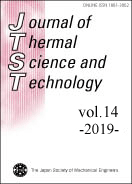
Journal of Thermal Science and Technology
Unveiling high-impact research in the heart of thermal engineering.Journal of Thermal Science and Technology, published by the Japan Society of Mechanical Engineers, is a distinguished open-access journal that has been serving the academic community since its inception in 2009. With a commitment to disseminating cutting-edge research in the realms of thermal science and its engineering applications, the journal has established itself as an essential resource for researchers, professionals, and students alike. Holding important quartile rankings in 2023, including Q3 in Atomic and Molecular Physics, Engineering (miscellaneous), and Materials Science (miscellaneous), this journal showcases high-impact studies that contribute to the advancement of technology and materials engineering. Open access since 2021, it aims to enhance the visibility and accessibility of critical research findings, thus fostering innovation and collaboration within the global scientific community. The journal’s dedicated editorial board actively seeks to publish novel insights that not only engage with existing challenges but also inspire future developments in thermal science and technology.

Applications in Energy and Combustion Science
Advancing Energy Solutions Through Innovative ResearchWelcome to Applications in Energy and Combustion Science, a premier open-access journal published by ELSEVIER that has been at the forefront of research since 2020. With the ISSN 2666-352X, this journal is dedicated to advancing the knowledge and application of energy technologies and combustion systems, reflecting a strong commitment to the evolving demands of the field. Based in the United Kingdom and recognized for its robust contributions, it has achieved noteworthy status in the 2023 rankings: a Q1 classification in both Chemical Engineering (miscellaneous) and Fuel Technology, alongside a Q2 standing in Energy (miscellaneous). Researchers will find it a significant platform, with Scopus rankings placing it among the top tiers in various categories. This journal offers an essential resource for professionals and students aiming to stay abreast of innovative developments and applications in the critical areas of energy and combustion, ensuring broad accessibility and dissemination of research findings.
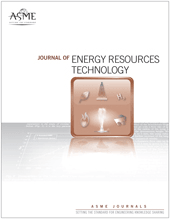
JOURNAL OF ENERGY RESOURCES TECHNOLOGY-TRANSACTIONS OF THE ASME
Illuminating the path to cutting-edge energy technology.JOURNAL OF ENERGY RESOURCES TECHNOLOGY-TRANSACTIONS OF THE ASME is a prestigious journal dedicated to advancing the knowledge and application of energy resources technology across various disciplines. Published by the American Society of Mechanical Engineers (ASME), this journal plays a critical role in fostering innovative research within energy engineering, fuel technology, geochemistry, and mechanical engineering, evidenced by its solid impact factor and commendable Scopus rankings, including a Q1 ranking in Mechanical Engineering. The journal's comprehensive scope covers a wide array of subjects, from renewable energy solutions to sustainability practices, making it an essential platform for researchers, professionals, and students eager to contribute to and stay abreast of developments in the energy sector. With an impressive convergence history dating back to 1979, it continues to uphold rigorous academic standards and provides valuable insights into the latest technological advancements and methodologies relevant to the field. While the journal does not offer open access options, it is unequivocally a vital resource for those engaged in cutting-edge energy research.
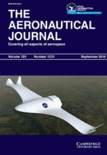
AERONAUTICAL JOURNAL
Connecting scholars to the skies of knowledge.Aeronautical Journal, published by Cambridge University Press, is a premier scholarly journal dedicated to advancing the field of aerospace engineering. With a notable impact factor, this journal holds a strong position in the academic community, ranked #53 out of 153 in the Scopus category of Aerospace Engineering, placing it in the 65th percentile. The journal has been providing a platform for groundbreaking research since its inception in 1969, and continues to be a vital resource for researchers, professionals, and students involved in aeronautics. As a Q2 journal in the 2023 Aerospace Engineering category, it offers high-quality articles that cover a range of topics within the discipline, contributing to the ongoing discourse and innovation in aerospace technologies. Although not an open-access journal, it remains accessible to a vast readership through institutional subscriptions and partnerships. The Aeronautical Journal is a crucial publication for those seeking to stay at the forefront of aerospace research and development.
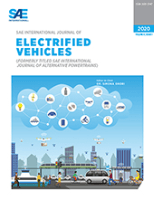
SAE International Journal of Electrified Vehicles
Catalyzing Advances in the Electrified Vehicle SectorSAE International Journal of Electrified Vehicles, published by SAE International, is a pioneering journal dedicated to the field of electrified transportation. Operating since 2020, this journal offers a crucial platform for researchers, engineers, and practitioners who are at the forefront of advancements in vehicle electrification and related technologies. With an ISSN of 2691-3747 and an E-ISSN of 2691-3755, it is indexed within respected databases, showcasing its commitment to high-quality research in Automotive Engineering and Fuel Technology. As part of the Q3 category in the 2023 rankings for both automotive and energy sectors, the journal facilitates the exchange of innovative ideas and groundbreaking studies that contribute to the evolution of the electrified vehicle industry. While currently not open access, the journal offers various subscription options for readers, making valuable insights accessible to a broad audience. Conducting research in this dynamic field, the SAE International Journal of Electrified Vehicles is vital for professionals striving to push the boundaries of technology and sustainability in modern transportation.

Fuels
Advancing Knowledge in Fuel Science and TechnologyFuels is a premier open-access journal published by MDPI, focusing on the multifaceted field of fuel science, technology, and applications. Since its inception in 2020, this journal (E-ISSN: 2673-3994) has rapidly become a vital resource for researchers, professionals, and students engaged in the exploration of sustainable fuel alternatives, combustion technologies, and energy conversion processes. Located in Basel, Switzerland, Fuels aims to disseminate high-quality research that not only advances academic understanding but also addresses real-world energy challenges. By embracing an open-access format, it ensures that significant findings are readily available to the global scientific community, helping to foster collaboration and innovation in the transition to cleaner energy solutions. With an emphasis on interdisciplinary research and practical applications, Fuels is poised to be a leading journal that shapes the future of energy technologies.

Automotive Innovation
Navigating the Next Wave of Automotive ExcellenceAutomotive Innovation is a leading academic journal dedicated to the advancements and transformative trends in the field of automotive engineering. Published by SpringerNature, this esteemed journal boasts an impressive Q1 ranking in Automotive Engineering for 2023, reflecting its high impact and relevance with a rank of #17 out of 125 in the Scopus database, placing it in the 86th percentile. Focused on publishing cutting-edge research from 2018 to 2024, it serves as an essential platform for researchers, professionals, and students interested in exploring the latest innovations, technologies, and practices in automotive design, manufacturing, and sustainability. Though not an open access journal, its commitment to advancing knowledge in automotive engineering makes it an invaluable resource for anyone invested in the future of transportation. For further insights and research findings, the journal can be accessed at its editorial office located in the United States.